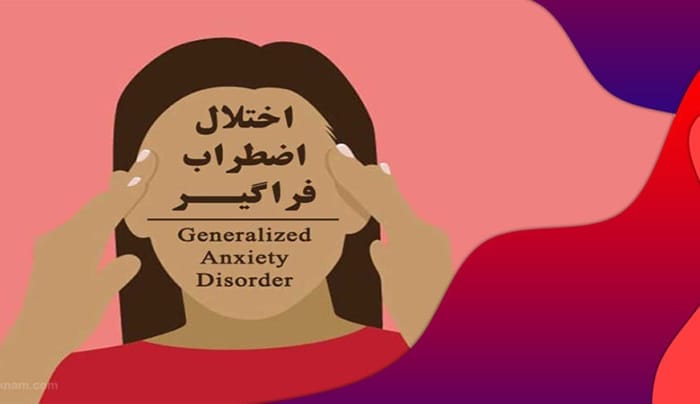
Blog
Generalized anxiety disorder

It’s normal to feel anxious at certain points in life, but persistent and disruptive anxiety needs to be addressed. Generalized anxiety disorder (GAD) is a particularly challenging condition that requires proper treatment and follow-up to help individuals make appropriate decisions and lead normal lives.
فهرست عناوین
ToggleWhat is Generalized Anxiety Disorder «GAD»?
This disorder causes individuals to experience continuous and severe worry, leading to significant stress and anxiety in everyday life. Anxiety dominates a person’s life, affecting their emotions and thoughts. In this disorder, anxiety overwhelms the individual’s ability to cope, making it difficult to manage the challenges associated with the condition.

Signs and Symptoms of Generalized Anxiety Disorder
Individuals must experience irrational worry and tension that disrupt their daily activities in at least two different areas of life, such as work and education, for at least six months.
- Individuals with Generalized Anxiety Disorder (GAD) often find themselves caught up in persistent thoughts and plans, and still feel as if they are not moving forward, which leads to anxiety and stress in both their professional and personal lives. This can make them feel like they are taking one step forward and two steps back. It’s important to note that experiencing everyday worries does not necessarily indicate the presence of GAD.
- These people get restless when they think about anything and lose their composure.
- People with this disorder experience difficulty focusing and often have a wandering mind, which disrupts their learning.
- People with this disorder experience a depletion of energy due to persistent anxiety, which hinders their ability to replicate past accomplishments. Consequently, their lives are disrupted, leading to growing frustration and potential depression.
- These people are impatient, it is difficult for them to tolerate ambiguities.
- They often avoid doing things because they feel that doing it is beyond their ability when this is their mentality and not reality.
- They worry about the opinions of others lest their position in their opinion change, and any change in people’s views might make them anxious, so they often seek to maintain the status quo.
- This type of anxiety disorder causes people to become fearful of decision-making and unable to make the right choices.
- These people irrationally worry that something horrible might happen to their loved ones.
- In every field, they expect the worst results.
Symptoms of Generalized Anxiety Disorder in Children and Adolescents
Children and adolescents, like adults, can exhibit the symptoms listed above, but they also have several chronic concerns in the following areas:
- Concerns and anxieties abound when running curricula.
- They take a lot of time to do homework.
- They may avoid going to school.
- They are worried about earthquakes and catastrophic events.
- Often, these people imagine the worst possible way in everything.
- To ensure that they have done something perfectly, they may repeat it many times to the extent that they may also fall into perfectionism.
- They go to great lengths to be approved by others.
Suggested article: Family psychology
Symptoms and Physical Problems of Generalized Anxiety Disorder
Pervasive anxiety disorder may be accompanied by the following physical symptoms and problems:
- Boredom
- Perspiration
- Headaches and migraines
- Tics
- Muscle tension
- Sleep disorders
- Digestive problems and irritable bowel syndrome

Causes of the formation of generalized anxiety disorder
A person’s genetics, environment, gender, and experiences are effective in the formation of this disorder.
Genetics: This disorder can be transmitted genetically from generation to generation.
Environment: One of the determining factors in the development of this disorder is the personality type of the individual, so the environment in which the child grows and the parenting style that the parents use are very important because they have a significant influence on the formation of the personality type. For example, timid people are more prone to this disorder than others.
Gender: Women are more prone to this disorder than men.
Experiences: People who have had traumatic experiences in childhood, a history of separation, divorce, or significant life changes are prone to generalized anxiety disorder, as well as a history of depression, drug abuse, and alcohol abuse also play a role in the development of this disorder.
Treatment of Generalized Anxiety Disorder
It is essential not to overlook the treatment of this disorder, as it can greatly improve the quality of life by restoring a sense of relaxation and leading to positive changes in thoughts and decisions. Treatment for this disorder varies from person to person and may involve a combination of drug therapy and psychotherapy, depending on the severity of the disorder
Psychotherapy: Psychotherapy, specifically cognitive-behavioral therapy, is highly effective in modifying thoughts and behaviors. By modifying a person’s cognitions, the therapist also changes their behaviors and reduces anxiety by providing an appropriate solution. In some cases, Supportive psychotherapy can also help people with this disorder and aid in managing daily anxiety stressors.
Pharmacotherapy, which may be short-term or long-term, depending on the severity of the disorder, often involves the use of antidepressants and benzodiazepines. In addition to these treatments, making lifestyle changes such as regular exercise, avoiding alcohol and drugs, maintaining a healthy diet, and getting adequate sleep can also significantly improve the treatment process.
برای مشاوره رایگان و رزرو وقت (یا اگر تماس گرفتید و قادر به پاسخگویی نبودیم) شماره تماس خود را وارد کنید. ما به زودی با شما تماس می گیریم!



